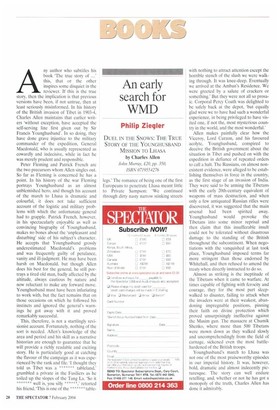An early search for WMD
Philip Ziegler
DUEL IN THE SNOWS: THE TRUE STORY OF THE YOUNGHUSBAND MISSION TO LHASA by Charles Allen John Murray, £20, pp. 350, ISBN 0719554276 Any author who subtitles his book 'The true story of ...' this, that or the other inspires some disquiet in the reviewer. If this is the true story, then the implication is that previous versions have been, if not untrue, then at least seriously misinformed. In his history of the British invasion of Tibet in 1903-4, Charles Allen maintains that earlier writers 'without exception, have accepted the self-serving line first given out by Sir Francis Younghusband'. In so doing, they have done grave injustice to the military commander of the expedition, General Macdonald, who is usually represented as cowardly and indecisive, while in fact he was merely prudent and responsible.
Peter Fleming and Patrick French are the two precursors whom Allen singles out. So far as Fleming is concerned he has a point. In his history of the war Fleming portrays Younghusband as an almost unblemished hero, and though his account of the march to Lhasa is dramatic and colourful, it does not take sufficient account of the logistic and military problems with which the unfortunate general had to grapple. Patrick French, however, in his spectacularly enjoyable as well as convincing biography of Younghusband, makes no bones about the 'unpleasant and disturbing' side of his subject's character. He accepts that Younghusband grossly underestimated Macdonald's problems and was frequently guilty of petulance, vanity and ill-judgment. He may have been harsh on Macdonald, but though Allen does his best for the general, he still portrays a tired old man, badly affected by the altitude, always cautious by nature and now reluctant to make any forward move. Younghusband must have been infuriating to work with, but the fact remains that on those occasions on which he followed his instincts and ignored the general's warnings he got away with it and proved remarkably successful.
This, therefore, is not a startlingly revisionist account. Fortunately, nothing of the sort is needed. Allen's knowledge of the area and period and his skill as a narrative historian are enough to guarantee that he will provide a richly readable and exciting story. He is particularly good at catching the flavour of the campaign as it was experienced by the rank and file. 'I thought they told us Tibet was a ***"" tableland,' grumbled a private in the Fusiliers as he toiled up the slopes of the Tang La. 'So it ******* well is, you silly """,' retorted his friend. 'This is one of the **"*"*' table legs.' The romance of being one of the first Europeans to penetrate Lhasa meant little to Private Sampson: 'We continued through dirty nasty narrow stinking streets
with nothing to attract attention except the horrible stench of the slush we were walking through. It was knee-deep. Eventually we arrived at the Amban's Residence. We were greeted by a salute of crackers or something.' But they were not all so prosaic. Corporal Percy Coath was delighted to be safely back at the depot, 'but equally glad were we to have had such a wonderful experience, in being privileged to have visited one, if not the, most mysterious country in the world, and the most wonderful.'
Allen makes painfully clear how the Viceroy, Lord Curzon, and his favoured acolyte, Younghusband, conspired to deceive the British government about the situation in Tibet and pushed on with the expedition in defiance of repeated orders to call a halt. The Russians, on almost nonexistent evidence, were alleged to be establishing themselves in force in the country, as the first stage of an invasion of India. They were said to be arming the Tibetans with the early 20th-century equivalent of weapons of mass destruction, and when only a few antiquated Russian rifles were discovered, it was suggested that the main arsenal had been spirited away. Younghusband would provoke the Tibetans into some minor reprisal and then claim that this insufferable insult could not be tolerated without disastrous damage to the standing of the British throughout the subcontinent. When negotiations with the vanquished at last took place, Younghusband imposed terms far more stringent than those endorsed by Whitehall, and then refused to amend the treaty when directly instructed to do so.
Almost as striking is the ineptitude of the Tibetans when it came to warfare. At times capable of fighting with ferocity and courage, they for the most part sleepwalked to disaster, failing to attack when the invaders were at their weakest, abandoning impregnable positions, pinning their faith on divine protection which proved unsurprisingly ineffective against the Maxim gun. The massacre at Chumik Shenko, where more than 500 Tibetans were mown down as they walked slowly and uncomprehendingly from the field of carnage, sickened even the most battlehardened of the British troops.
Younghusband's march to Lhasa was not one of the most praiseworthy episodes in our imperial history. It was, however, bold, dramatic and almost indecently picturesque. The story Can well endure retelling, and, whether or not he has got a monopoly of the truth, Charles Allen has done it admirably.


























































 Previous page
Previous page